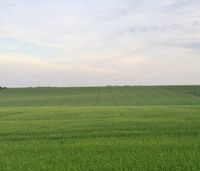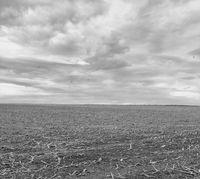"Why should I have to scrape a living cooped up here when I could be leading a good life somewhere else?"
We all know the idealized 'other field,' the rural equivalent of 'the grass is always greener.' It's not merely wanting more; it's the slinky promise that unrealized possessions will deliver happiness and should be sought to the detriment of the existing possessions (and even the possessor himself.) "Why should I have to scrape a living cooped up here when I could be leading a good life somewhere else?" asks the titular character of Tolstoy's parable How Much Land Does A Man Need? And we nod, thinking, why not?
Lev Nikolayevich "Leo" Tolstoy (September 9, 1828 - November 20, 1910) lived in a century that defined this mentality. The underpinnings of 20th-century materialism began with codified land ownership in the 19th century. Land became more than income; it was the promise of more and more income. Once common lands in England, for example, were carved up and fenced in by various Enclosure Acts (read John Clare's beautiful lamentations on the lost open land).
 Photograph by Ellen Vrana.
Photograph by Ellen Vrana.Tolstoy was born into a monied family but grew increasingly against the way private wealth perpetuated class divides. He used his tremendous literary ability to demonstrate the costs of such systems. His 1886 parable How Much Land Does A Man Need? is a short but highly efficient tale of riches, obsession, and progressive greed. It begins with a Russian peasant, Pakhom, who readily admits to a life-long desire for more land.
My only grievance is that I don't have enough land. Give me enough of that and I'd fear no one - not even the Devil himself!' But the Devil had been sitting behind the stove and had heard everything. He was delighted that a peasant's wife had led her husband to boast that if he had enough land, he would fear no one, not even the Devil. 'Good!' he thought, 'I'll have a little game with you. I shall see that you have plenty of land, and that way, I'll get you in my clutches.
In case we doubt Tolstoy's moralistic approach to land ownership, he introduces the main character's hubris and, of course, the Devil himself. The plot slips by slowly, and Parkham accumulates more land, both opportunistically and with some shady deals.
'Everyone's buying land,' he said. 'We must get hold of twenty acres, or thereabouts. If we don't, we won't be able to live, what with that manager bleeding us white with fines. So they racked their brains as to how they could buy some of the land. They had a hundred roubles saved up so that by selling a foal and half their bees, sending one of their sons out to work for someone who paid wages in advance, and borrowing from a brother-in-law, they managed to scrape together half the money. Then Pakhom took the money, chose about thirty acres of partly wooded land, and went off to the lady to see if he could strike a deal. He managed to get the thirty acres, they shook hands on it, and Pakhom paid a deposit. ... And so Pakhom now had land.
 Photograph by Ellen Vrana.
Photograph by Ellen Vrana.Pakhom's desire subtly develops from "wanting enough land" to "wanting enough land to survive." Fortunately for these goals, he hears of a scheme to acquire land beyond imagination. Land for farming, land for grazing, and land for renting to others. The Devil is involved surreptitiously, as he often is with schemes, and proposes a simple match of will. Pakhom can have all the land his heart desires if he runs its outline before the sun sets. The former peasant agrees, understandably so, because there appears to be no downside. He goes to bed preparing himself for this physical manifestation of the property scramble.
On the day of the scramble, "Pakhom's eyes lit up, for the land was all virgin soil..." The temptation is endless, and the race begins, "he walked neither quickly nor slowly..." yet he keeps walking and walking.
Pakhom found the going tough. The heat had exhausted him, his bare feet were cut and bruised, and his legs were giving way. He wanted to rest, but this was out of the question - he would never get back by sunset. The sun waits for no man and was sinking lower and lower. 'Oh,' he wondered, 'have I blundered, trying to take too much? What if I'm not back in time?'
 Photograph by Ellen Vrana.
Photograph by Ellen Vrana.But it is never that simple. One must not merely finish but limit oneself to a course that allows finishing. "It's no good trying to grab too much. I've quite enough already," our hero admits, and we almost believe him. Meanwhile, the "hill was far off, and the sun was close to the horizon."
Pakhom struggled on. Although it was very hard, he walked faster and faster. On and on he went - but there was still a long way to go. He started running and threw away his coat, boots, flask, and cap, keeping only the spade he used for leaning on. 'Oh dear,' he thought, 'I've been too greedy. Now I've ruined it. I'll never get back by sunset.' His fear made him only more breathless. On he ran, his shirt soaking and his trousers clinging to him: his throat was parched. His lungs were working like a blacksmith's bellows, his heart beat like a hammer and his legs did not seem to be his - he felt that they were breaking... Pakhom was terrified and thought, 'All this strain will be the death of me.’
In the end, the land Pakhom claims is the exact size of his exhausted body when he collapses, dead. Parable characters have no character, no self-awareness, or actualization. They exist to demonstrate, instruct, and live out the morality of the author. Tolstoy's detailed realism, however, shows the diminishing returns of ownership (and the self-corruption of an overly desirous self). And we lament Pakhom's downfall.
In the story's beginning, two sisters, one the wife of a wealthy merchant and the other married to our dear Pakhom, disagree on the nature of wealth and life. The elder argues that riches lead to freedom from a living living next to the mud and pigs. The younger sister maintains that not seeking money enables an existence of never owing anything to anyone (especially the Devil). If only the wife had been in charge of the finances.

